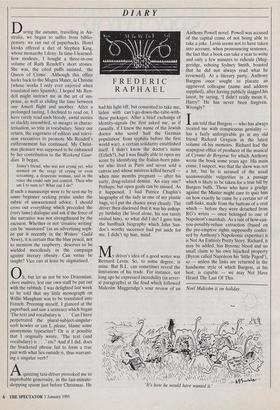DIARY
FREDERIC RAPHAEL During the autumn, travelling in Au- stralia, we began to suffer from biblio- penury; we ran out of paperbacks. Hotel kiosks offered a diet of Stephen King, whose monarchy I deny. In time-I-learned- how modesty, I bought a three-in-one volume of Ruth Rendell's short stories. She was, the cited puffs insisted, 'the Queen of Crime'. Although this office harks back to the Magna Mater, la Christie (whose works I only ever enjoyed when translated into Spanish), I hoped Ms Ren- dell might instruct me in the art of sus- pense, as well as eliding the time between one Ansett flight and another. After a prolonged tasting, I declined to read on. I have rarely read such bloody, awful stories so slackly assembled, so meagre in charac- terisation, so trite in vocabulary. Since our return, the eagerness of editors and televi- sion executives to promote Ms Rendell's enthronement has continued. My Christ- mas pleasure was supposed to be enhanced by her contribution to the Weekend Guar- dian. It began,
Jenny's friend, who was not crying yet, who seemed on the verge of crying or even screaming, a desperate woman, said in the voice she could only just control, 'Then who am Ito turn to? What can I do?'
If such a manuscript were to be sent me by some beginner seeking praise under the rubric of unsweetened advice, I should cross out everything which preceded the (very lame) dialogue and ask if the force of the narrative was not strengthened by the excision. Whether or not 'creative writing' can be `mentored' (as an advertising soph- ist put it recently in the Writers' Guild News), it is certain that the blue pencil, not to mention the raspberry, deserves to be wielded mercilessly in the campaign against literary obesity. Can virtue be taught? Vice can at least be stigmatised.
0 h, but let us not be too Draconian, chers maltres, lest our own stuff be put out with the rubbish. I was delighted last week to be told that my little monograph on Willie Maugham was to be translated into French. Preening myself, I glanced at the paperback and saw a sentence which began `The text and vocabulary is . . ' Can I have perpetrated the plural-subject-singular- verb howler or can I, please, blame some anonymous typesetter? Or is it possible that I originally wrote, 'The text (and vocabulary) is . . .' etc? And if I did, does the bracketed phrase fail to form a true pair with what lies outside it, thus warrant- ing a singular verb?
Aquizzing taxi-driver provoked me to improbable generosity, in the last-minute- shopping spasm just before Christmas. He had his light off, but consented to take me, laden with can't-go-down-the-tube-with- these packages. After a brief exchange of identity-signals (he first asked me, as if casually, if I knew the name of the Jewish doctor who saved 'half the German population' from syphilis before the first world war), a certain solidarity established itself. I didn't know the doctor's name (Erlich?), but I was finally able to open my score by identifying the Italian-born pain- ter who lived in Paris and never sold a canvas and whose mistress killed herself when nine months pregnant — after his early, drug-related demise. An easy one? Perhaps; but open goals can be missed. As it happened, I had Patrice Chaplin's biography of the lady in one of my plastic bags, so I put the chance away cleanly. The driver then disclosed that it was his unhap- py birthday (he lived alone, his son rarely visited him), so what did I do? I gave him the hardback biography which John San- doe's worthy successor had put aside for me. I didn't tip him, mind.
My driver's idea of a good writer was Bernard Levin. So, to some degree, is mine. But B.L. can sometimes reveal the limitations of his trade. For instance, not long ago he expressed incredulity (in sever- al paragraphs) at the feud which followed Malcolm Muggeridge's sour review of an Anthony Powell novel. Powell was accused of the capital crime of not being able to take a joke. Levin seems not to have taken into account, when pronouncing sentence, the fact that a book can take a year to write and only a few minutes to ridicule (Mug- geridge, echoing Sydney Smith, boasted that he did not always read what he reviewed). At a literary party, Anthony Burgess once sought to placate an aggrieved colleague (name and address supplied), after having publicly slagged his latest, by saying, 'I didn't really mean it, Harry!' He has never been forgiven. Wrongly?
Iam told that Burgess — who has always treated me with conspicuous geniality has a fairly unforgivable go at my old friend Richard Gregson in the latest volume of. his memoirs. Richard had the scapegoat office of producer of the musical of Cyrano de Bergerac for which Anthony wrote the book some years ago. His main crime, I suspect, was that the show was not a hit, but he is accused of the usual unanswerable vulgarities in a passage which is likely to be taken for a true bill by Burgess buffs. Those who have a grudge against the Master might care to quiz him on how exactly he came by a certain set of cuff-links, made from the buttons of a coat which — before they were detached from RG's wrists — once belonged to one of Napoleon's marshals. As a tale of how-can- you-possibly-refuse extraction (based on the pre-emptive rights supposedly confer- red by Anthony's Napoleonic expertise) it is Not An Entirely Pretty Story. Richard, it may be added, has Byronic blood and no small claim to his own hijacked property (Byron called Napoleon his 'little Pagod'), so — unless the links are returned in the handsome style of which Burgess, at his best, is capable — we may Not Have Heard The Last Of This.










































 Previous page
Previous page